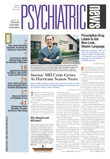African-American children are especially vulnerable to antipsychiatry messages condemning treatment for attention-deficit/hyperactivity disorder (ADHD), experts say, which keeps many from needed treatment.
As a result, some of these untreated children end up in the criminal justice system and special education settings, where behavioral problems are less likely to be addressed.
“At the same time that we are developing new strategies to treat brain illnesses, we are also struggling with propaganda, stigma, and discrimination regarding diagnosis and treatment,” Rahn Bailey, M.D., told Psychiatric News. “That burden is shouldered disproportionately by African Americans.”
Bailey, who is chair of the National Medical Association's section on psychiatry and the behavioral sciences and medical director of Bailey Psychiatric Associates in Houston, hosted a conference call on ADHD in African-American communities set up through the National Alliance on Mental Illness (NAMI) Multicultural Action Center on ADHD in April.
During the call, he noted that many African Americans may be reluctant to seek psychiatric treatment in general because it is sometimes perceived as being “contrary to spiritual beliefs” and because family members and friends may view psychiatric treatment as a “personal failure.”
Antipsychiatry groups compound stigmatizing attitudes by flooding these communities with literature claiming that “Ritalin kills” and“ psychiatry created racism,” according to psychiatrist Carl Bell, M.D., director of the Community Mental Health Council in Chicago.
Even mental health professionals working in African-American communities are targeted with “slick, 30-page monographs,” he said, with messages warning of the dangers of psychiatric medications.
Bell and his staff carefully evaluate children for ADHD and do not rush to put them on medications, he said.
Typically, he noted, they may first try family therapy and work with school personnel to correct behavior problems in children, but “when that doesn't work, we suggest Ritalin if the child has been diagnosed with ADHD.”
Bell said he feels as if he is fighting an uphill battle.
“Parents tell me that putting their kids on Ritalin is a genocidal plot,” Bell said.
One misconception held by many African Americans, according to Bell and Bailey, is that ADHD is overdiagnosed in African-American children and that many are placed on psychostimulants unnecessarily.
Bailey emphasized that psychiatrists can be effective in countering false or negative antipsychiatry messages with scientific data, which show that African Americans do not receive adequate treatment for ADHD compared with nonminority groups.
For instance, according to Regina Bussing, M.D., in a random sample of 1,615 elementary school students in Florida, a study found that Caucasian children with elevated scores on an ADHD rating scale were more than twice as likely as their African-American peers to receive an evaluation for a behavioral problem, be diagnosed with ADHD, or be under treatment for ADHD.
The study appeared in the April/June 2003 Journal of Behavioral Health Services and Research.
Bussing is a professor and training director in the Department of Child and Adolescent Psychiatry at the University of Florida.
In an earlier study, Bussing found that among the parents of children at high risk for ADHD, fewer African-American parents than white parents had heard of the disorder (69 percent vs. 95 percent, respectively).
In addition, only 17.5 percent of African-American parents reported having received information about ADHD from their physicians, compared with 29 percent of white parents.
A study by Julie Zito, Ph.D., examining 1991 Medicaid data in Maryland found that among 100 enrollees, African-American youth aged 5 through 14 with Medicaid insurance were less likely to have been prescribed psychotropic medications than Caucasian youths with Medicaid insurance (39 percent to 52 percent).
Regarding stimulants, African-American children were prescribed psychostimulants at a ratio of 1:2.5 when compared with the prescription rates for Caucasian children, Zito found.
The study appeared in the February 1998 Journal of the American Academy of Child and Adolescent Psychiatry.
According to Bailey, one of the consequences of this disparity in ADHD treatment for African-American children is that they are often dealt with in inappropriate ways. “Per capita, there are about twice as many African-American children in some form of remedial education” as white youth, he noted, and African-American children are overrepresented in criminal justice settings.
“It is our job to educate people,” he continued.“ Treatment is available, and it works.” ▪

